clm_time_manager Module Reference
Functions/Subroutines | |
| subroutine, public | get_timemgr_defaults (calendar_out, start_ymd_out, start_tod_out, ref_ymd_out, ref_tod_out, stop_ymd_out, stop_tod_out, nelapse_out, dtime_out) |
| subroutine, public | set_timemgr_init (calendar_in, start_ymd_in, start_tod_in, ref_ymd_in, ref_tod_in, stop_ymd_in, stop_tod_in, perpetual_run_in, perpetual_ymd_in, nelapse_in, dtime_in) |
| subroutine, public | timemgr_init () |
| subroutine, private | init_clock (start_date, ref_date, curr_date, stop_date) |
| type(esmf_time) function | timesetymd (ymd, tod, desc) |
| integer function, private | timegetymd (date, tod) |
| subroutine, public | timemgr_restart_io (ncid, flag) |
| subroutine, public | timemgr_restart () |
| subroutine, public | calc_nestep () |
| subroutine, private | init_calendar () |
| subroutine, private | timemgr_print () |
| subroutine, public | advance_timestep () |
| subroutine, public | get_clock (clock) |
| type(esmf_time) function, public | get_curr_esmf_time () |
| integer function, public | get_step_size () |
| real(r8) function, public | get_step_size_real () |
| subroutine, public | update_rad_dtime (doalb) |
| integer function, public | get_rad_step_size () |
| integer function, public | get_nstep () |
| subroutine, public | get_curr_date (yr, mon, day, tod, offset) |
| subroutine, public | get_curr_time_string (dateTimeString) |
| subroutine, public | get_perp_date (yr, mon, day, tod, offset) |
| subroutine, public | get_prev_date (yr, mon, day, tod) |
| subroutine, public | get_start_date (yr, mon, day, tod) |
| integer function, public | get_driver_start_ymd (tod) |
| subroutine, public | get_ref_date (yr, mon, day, tod) |
| subroutine, public | get_curr_time (days, seconds) |
| subroutine, public | get_prev_time (days, seconds) |
| real(r8) function, public | get_curr_calday (offset) |
| real(r8) function, public | get_calday (ymd, tod) |
| character(len=esmf_maxstr) function, public | get_calendar () |
| integer function, public | get_days_per_year (offset) |
| real(r8) function, public | get_curr_yearfrac (offset) |
| real(r8) function, public | get_prev_yearfrac () |
| subroutine, public | get_rest_date (ncid, yr) |
| subroutine, public | set_nextsw_cday (nextsw_cday_in) |
| logical function, public | is_beg_curr_day () |
| logical function, public | is_end_curr_day () |
| logical function, public | is_end_curr_month () |
| logical function, public | is_beg_curr_year () |
| logical function, public | is_end_curr_year () |
| logical function, public | is_first_step () |
| logical function, public | is_first_restart_step () |
| logical function, public | is_last_step () |
| logical function, public | is_perpetual () |
| subroutine, public | timemgr_datediff (ymd1, tod1, ymd2, tod2, days) |
| subroutine | chkrc (rc, mes) |
| character(len=len(str)) function | to_upper (str) |
| logical function, public | is_restart () |
| subroutine, private | timemgr_spmdbcast () |
| subroutine, private | check_timemgr_initialized (caller) |
| subroutine, public | timemgr_reset () |
| subroutine | for_test_set_curr_date (yr, mon, day, tod) |
Variables | |
| character(len= *), parameter, public | no_leap_c = 'NO_LEAP' |
| character(len= *), parameter, public | gregorian_c = 'GREGORIAN' |
| character(len=esmf_maxstr), save | calendar = NO_LEAP_C |
| integer, parameter | uninit_int = -999999999 |
| real(r8), parameter | uninit_r8 = -999999999.0 |
| integer, save | dtime = uninit_int |
| integer, save | dtime_rad = uninit_int |
| integer, save | nstep_rad_prev = uninit_int |
| integer, save | nelapse = uninit_int |
| integer, save | start_ymd = uninit_int |
| integer, save | start_tod = 0 |
| integer, save | stop_ymd = uninit_int |
| integer, save | stop_tod = 0 |
| integer, save | ref_ymd = uninit_int |
| integer, save | ref_tod = 0 |
| type(esmf_calendar), target, save | tm_cal |
| type(esmf_clock), save | tm_clock |
| type(esmf_time), save | tm_perp_date |
| integer, save | rst_step_sec = uninit_int |
| integer, save | rst_start_ymd = uninit_int |
| integer, save | rst_start_tod = uninit_int |
| integer, save | rst_ref_ymd = uninit_int |
| integer, save | rst_ref_tod = uninit_int |
| integer, save | rst_curr_ymd = uninit_int |
| integer, save | rst_curr_tod = uninit_int |
| integer, save | rst_nstep_rad_prev |
| integer, save | perpetual_ymd = uninit_int |
| logical, save | tm_first_restart_step = .false. |
| logical, save | tm_perp_calendar = .false. |
| logical, save | timemgr_set = .false. |
| integer, save, public | nestep = uninit_int |
| integer, save, public | nsstep = 0 |
| real(r8) | nextsw_cday = uninit_r8 |
Function/Subroutine Documentation
◆ advance_timestep()
| subroutine, public clm_time_manager::advance_timestep | ( | ) |
Here is the call graph for this function:

Here is the caller graph for this function:

◆ calc_nestep()
| subroutine, public clm_time_manager::calc_nestep | ( | ) |
Here is the call graph for this function:

Here is the caller graph for this function:

◆ check_timemgr_initialized()
|
private |
Here is the caller graph for this function:
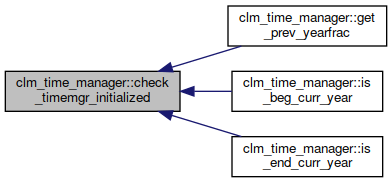
◆ chkrc()
|
private |
Here is the caller graph for this function:

◆ for_test_set_curr_date()
|
private |
Here is the call graph for this function:

◆ get_calday()
| real(r8) function, public clm_time_manager::get_calday | ( | integer, intent(in) | ymd, |
| integer, intent(in) | tod | ||
| ) |
Here is the call graph for this function:

Here is the caller graph for this function:

◆ get_calendar()
| character(len=esmf_maxstr) function, public clm_time_manager::get_calendar | ( | ) |
Here is the caller graph for this function:

◆ get_clock()
| subroutine, public clm_time_manager::get_clock | ( | type(esmf_clock), intent(inout) | clock | ) |
Here is the call graph for this function:

◆ get_curr_calday()
| real(r8) function, public clm_time_manager::get_curr_calday | ( | integer, intent(in), optional | offset | ) |
Here is the call graph for this function:

Here is the caller graph for this function:

◆ get_curr_date()
| subroutine, public clm_time_manager::get_curr_date | ( | integer, intent(out) | yr, |
| integer, intent(out) | mon, | ||
| integer, intent(out) | day, | ||
| integer, intent(out) | tod, | ||
| integer, intent(in), optional | offset | ||
| ) |
Here is the call graph for this function:

Here is the caller graph for this function:
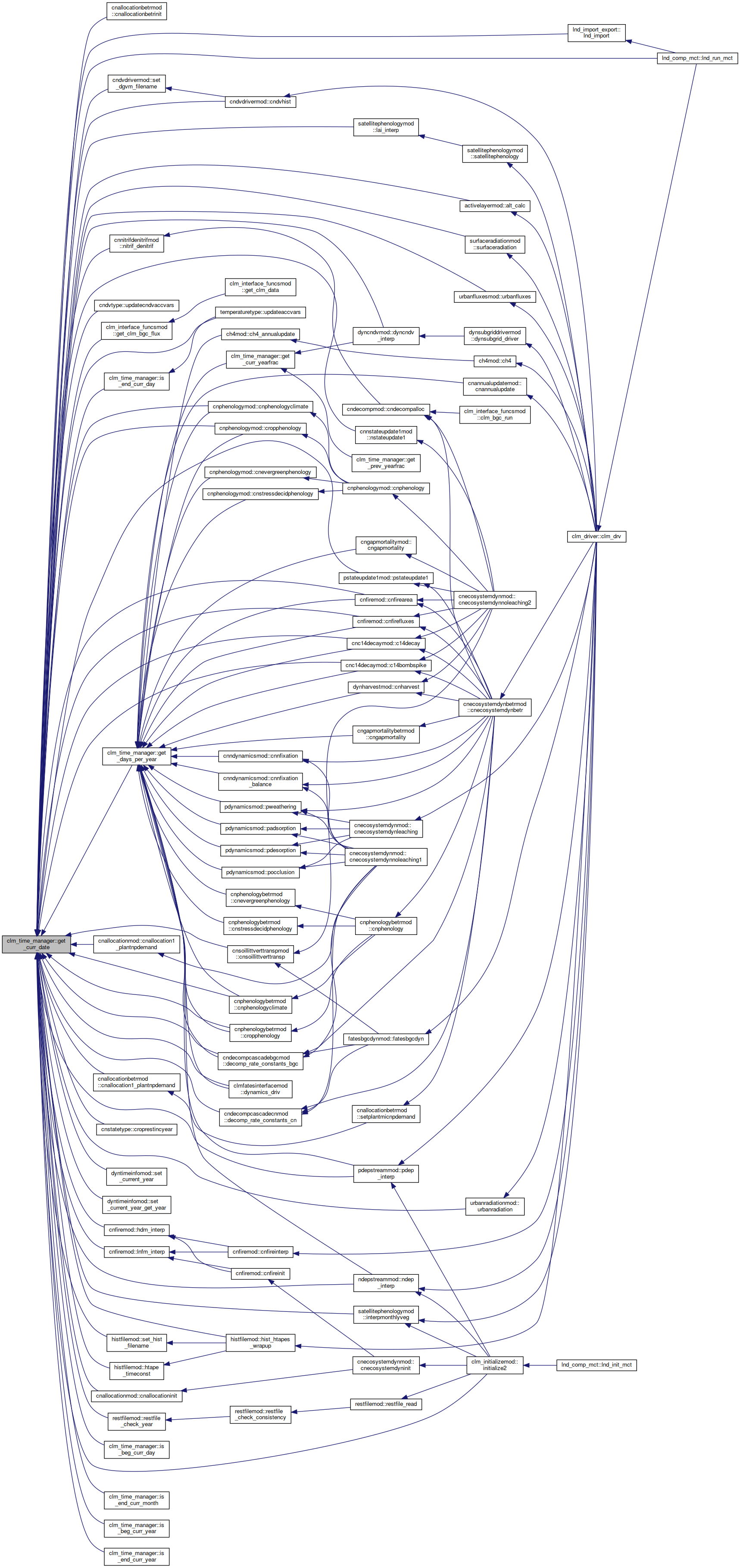
◆ get_curr_esmf_time()
| type(esmf_time) function, public clm_time_manager::get_curr_esmf_time | ( | ) |
Here is the call graph for this function:

◆ get_curr_time()
| subroutine, public clm_time_manager::get_curr_time | ( | integer, intent(out) | days, |
| integer, intent(out) | seconds | ||
| ) |
Here is the call graph for this function:

Here is the caller graph for this function:

◆ get_curr_time_string()
| subroutine, public clm_time_manager::get_curr_time_string | ( | character(len=*), intent(out) | dateTimeString | ) |
Here is the call graph for this function:

◆ get_curr_yearfrac()
| real(r8) function, public clm_time_manager::get_curr_yearfrac | ( | integer, intent(in), optional | offset | ) |
Here is the call graph for this function:

Here is the caller graph for this function:

◆ get_days_per_year()
| integer function, public clm_time_manager::get_days_per_year | ( | integer, intent(in), optional | offset | ) |
Here is the call graph for this function:

Here is the caller graph for this function:
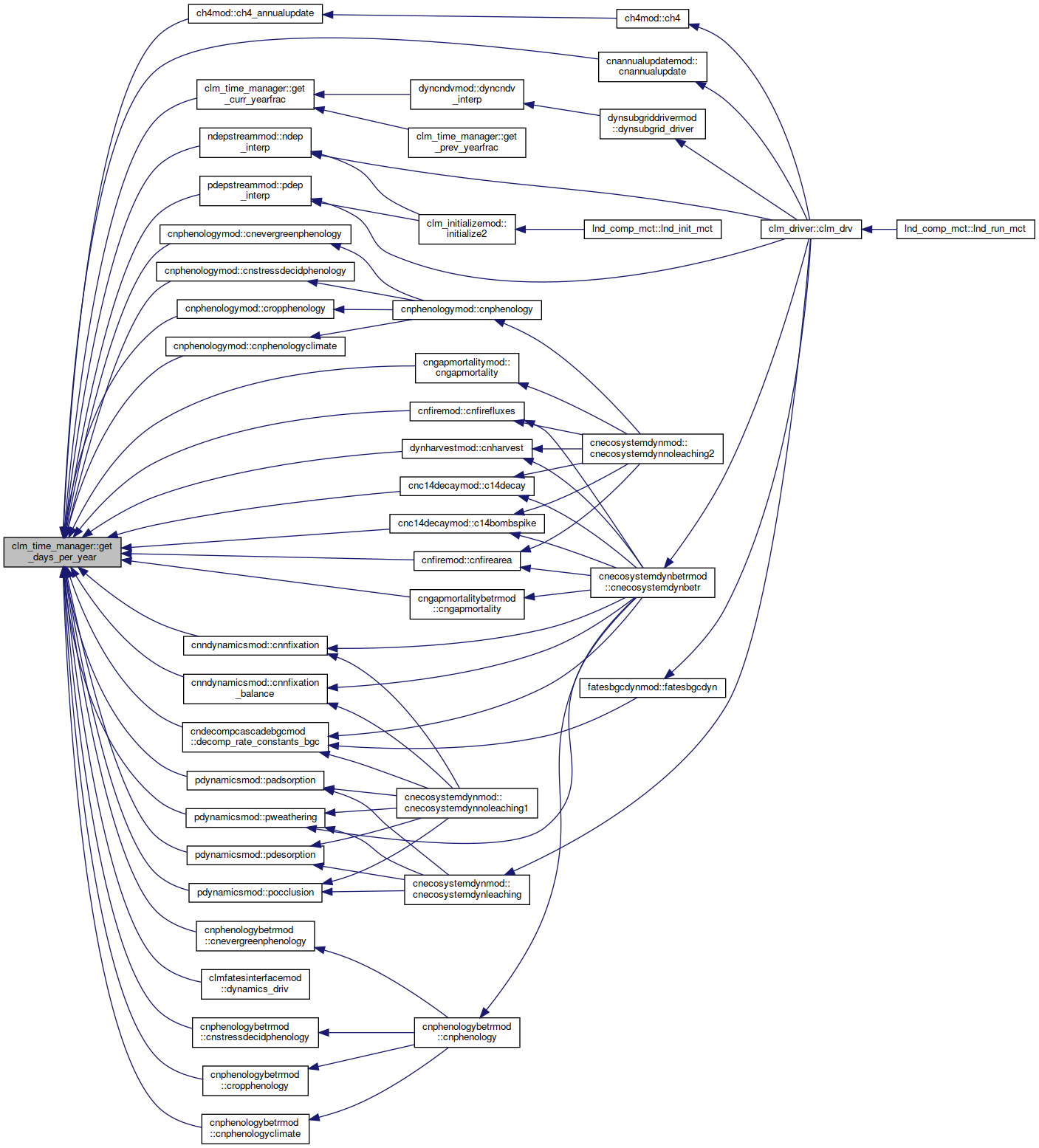
◆ get_driver_start_ymd()
| integer function, public clm_time_manager::get_driver_start_ymd | ( | integer, intent(out), optional | tod | ) |
Here is the caller graph for this function:

◆ get_nstep()
| integer function, public clm_time_manager::get_nstep | ( | ) |
Here is the call graph for this function:

Here is the caller graph for this function:
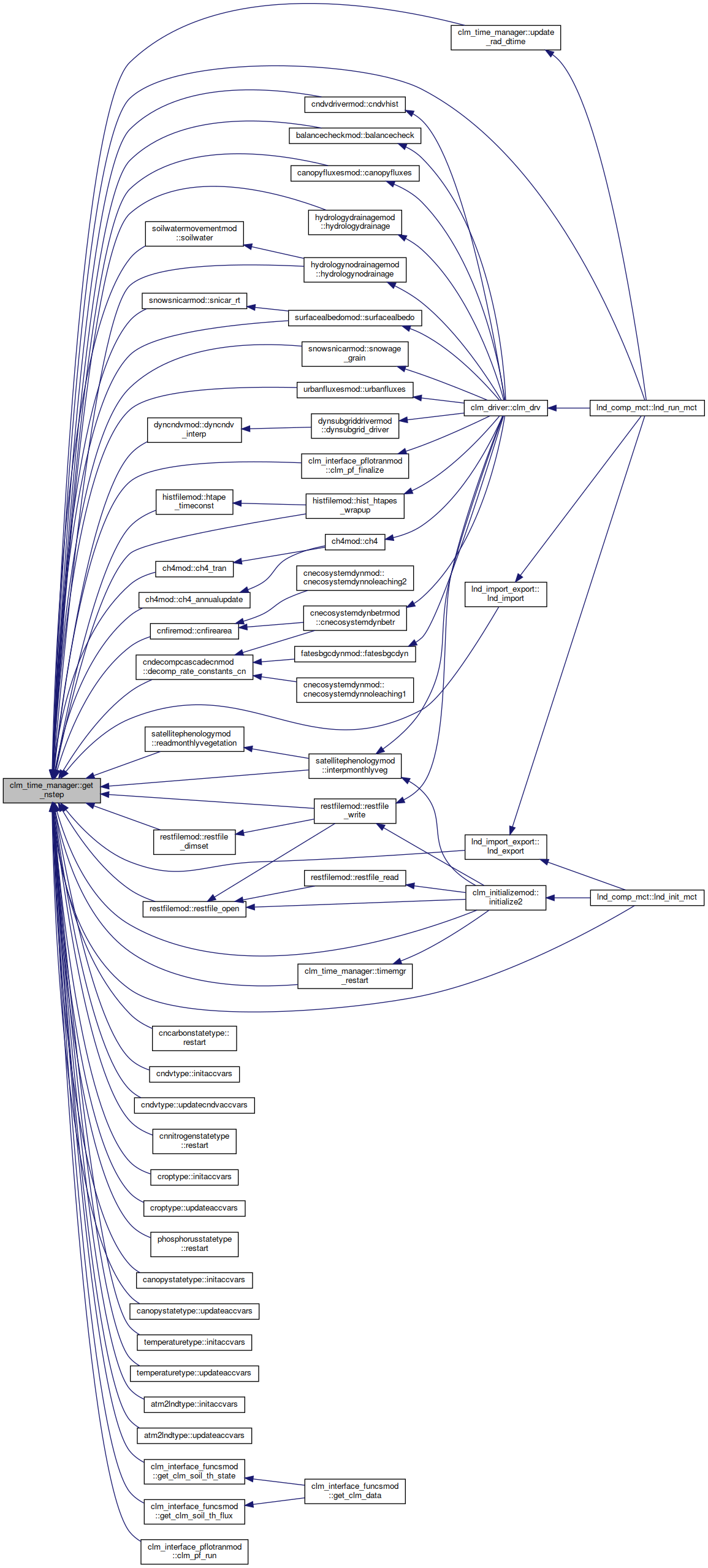
◆ get_perp_date()
| subroutine, public clm_time_manager::get_perp_date | ( | integer, intent(out) | yr, |
| integer, intent(out) | mon, | ||
| integer, intent(out) | day, | ||
| integer, intent(out) | tod, | ||
| integer, intent(in), optional | offset | ||
| ) |
Here is the call graph for this function:

◆ get_prev_date()
| subroutine, public clm_time_manager::get_prev_date | ( | integer, intent(out) | yr, |
| integer, intent(out) | mon, | ||
| integer, intent(out) | day, | ||
| integer, intent(out) | tod | ||
| ) |
Here is the call graph for this function:

Here is the caller graph for this function:

◆ get_prev_time()
| subroutine, public clm_time_manager::get_prev_time | ( | integer, intent(out) | days, |
| integer, intent(out) | seconds | ||
| ) |
Here is the call graph for this function:

Here is the caller graph for this function:

◆ get_prev_yearfrac()
| real(r8) function, public clm_time_manager::get_prev_yearfrac | ( | ) |
Here is the call graph for this function:

◆ get_rad_step_size()
| integer function, public clm_time_manager::get_rad_step_size | ( | ) |
Here is the call graph for this function:

Here is the caller graph for this function:

◆ get_ref_date()
| subroutine, public clm_time_manager::get_ref_date | ( | integer, intent(out) | yr, |
| integer, intent(out) | mon, | ||
| integer, intent(out) | day, | ||
| integer, intent(out) | tod | ||
| ) |
Here is the call graph for this function:

Here is the caller graph for this function:

◆ get_rest_date()
| subroutine, public clm_time_manager::get_rest_date | ( | type(file_desc_t), intent(inout) | ncid, |
| integer, intent(out) | yr | ||
| ) |
Here is the caller graph for this function:

◆ get_start_date()
| subroutine, public clm_time_manager::get_start_date | ( | integer, intent(out) | yr, |
| integer, intent(out) | mon, | ||
| integer, intent(out) | day, | ||
| integer, intent(out) | tod | ||
| ) |
Here is the call graph for this function:

Here is the caller graph for this function:

◆ get_step_size()
| integer function, public clm_time_manager::get_step_size | ( | ) |
Here is the call graph for this function:

Here is the caller graph for this function:

◆ get_step_size_real()
| real(r8) function, public clm_time_manager::get_step_size_real | ( | ) |
◆ get_timemgr_defaults()
| subroutine, public clm_time_manager::get_timemgr_defaults | ( | character(len=*), intent(out), optional | calendar_out, |
| integer, intent(out), optional | start_ymd_out, | ||
| integer, intent(out), optional | start_tod_out, | ||
| integer, intent(out), optional | ref_ymd_out, | ||
| integer, intent(out), optional | ref_tod_out, | ||
| integer, intent(out), optional | stop_ymd_out, | ||
| integer, intent(out), optional | stop_tod_out, | ||
| integer, intent(out), optional | nelapse_out, | ||
| integer, intent(out), optional | dtime_out | ||
| ) |
Here is the caller graph for this function:

◆ init_calendar()
|
private |
Here is the call graph for this function:

Here is the caller graph for this function:

◆ init_clock()
|
private |
Here is the call graph for this function:

Here is the caller graph for this function:

◆ is_beg_curr_day()
| logical function, public clm_time_manager::is_beg_curr_day | ( | ) |
Here is the call graph for this function:

◆ is_beg_curr_year()
| logical function, public clm_time_manager::is_beg_curr_year | ( | ) |
Here is the call graph for this function:

◆ is_end_curr_day()
| logical function, public clm_time_manager::is_end_curr_day | ( | ) |
Here is the call graph for this function:

Here is the caller graph for this function:

◆ is_end_curr_month()
| logical function, public clm_time_manager::is_end_curr_month | ( | ) |
Here is the call graph for this function:

◆ is_end_curr_year()
| logical function, public clm_time_manager::is_end_curr_year | ( | ) |
Here is the call graph for this function:

◆ is_first_restart_step()
| logical function, public clm_time_manager::is_first_restart_step | ( | ) |
Here is the caller graph for this function:

◆ is_first_step()
| logical function, public clm_time_manager::is_first_step | ( | ) |
Here is the call graph for this function:

Here is the caller graph for this function:

◆ is_last_step()
| logical function, public clm_time_manager::is_last_step | ( | ) |
Here is the call graph for this function:

Here is the caller graph for this function:

◆ is_perpetual()
| logical function, public clm_time_manager::is_perpetual | ( | ) |
◆ is_restart()
| logical function, public clm_time_manager::is_restart | ( | ) |
Here is the caller graph for this function:
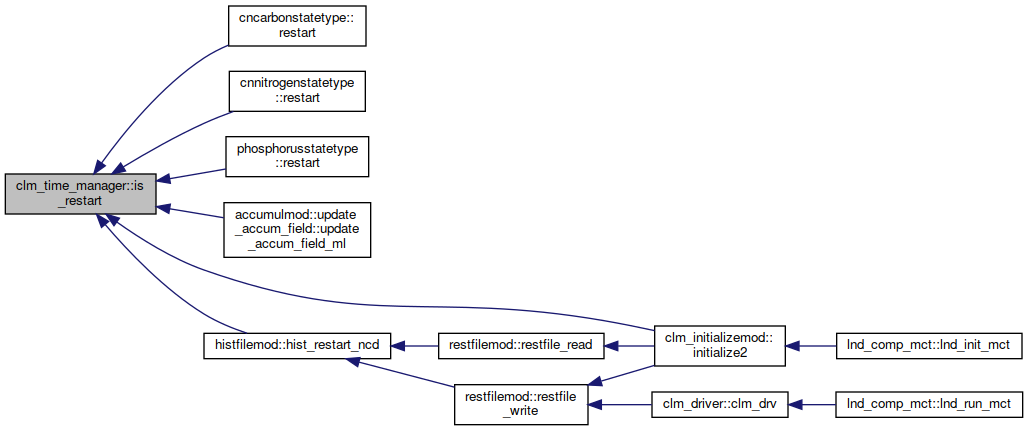
◆ set_nextsw_cday()
| subroutine, public clm_time_manager::set_nextsw_cday | ( | real(r8), intent(in) | nextsw_cday_in | ) |
Here is the caller graph for this function:

◆ set_timemgr_init()
| subroutine, public clm_time_manager::set_timemgr_init | ( | character(len=*), intent(in), optional | calendar_in, |
| integer, intent(in), optional | start_ymd_in, | ||
| integer, intent(in), optional | start_tod_in, | ||
| integer, intent(in), optional | ref_ymd_in, | ||
| integer, intent(in), optional | ref_tod_in, | ||
| integer, intent(in), optional | stop_ymd_in, | ||
| integer, intent(in), optional | stop_tod_in, | ||
| logical, intent(in), optional | perpetual_run_in, | ||
| integer, intent(in), optional | perpetual_ymd_in, | ||
| integer, intent(in), optional | nelapse_in, | ||
| integer, intent(in), optional | dtime_in | ||
| ) |
Here is the caller graph for this function:

◆ timegetymd()
|
private |
Here is the call graph for this function:

Here is the caller graph for this function:

◆ timemgr_datediff()
| subroutine, public clm_time_manager::timemgr_datediff | ( | integer, intent(in) | ymd1, |
| integer, intent(in) | tod1, | ||
| integer, intent(in) | ymd2, | ||
| integer, intent(in) | tod2, | ||
| real(r8) | days | ||
| ) |
Here is the call graph for this function:

Here is the caller graph for this function:

◆ timemgr_init()
| subroutine, public clm_time_manager::timemgr_init | ( | ) |
Here is the call graph for this function:
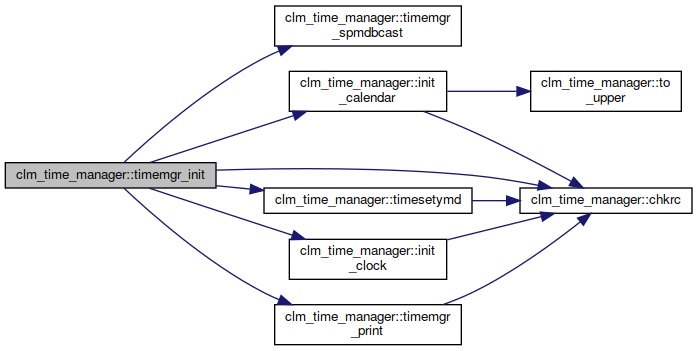
Here is the caller graph for this function:

◆ timemgr_print()
|
private |
Here is the call graph for this function:

Here is the caller graph for this function:

◆ timemgr_reset()
| subroutine, public clm_time_manager::timemgr_reset | ( | ) |
Here is the call graph for this function:

◆ timemgr_restart()
| subroutine, public clm_time_manager::timemgr_restart | ( | ) |
Here is the call graph for this function:
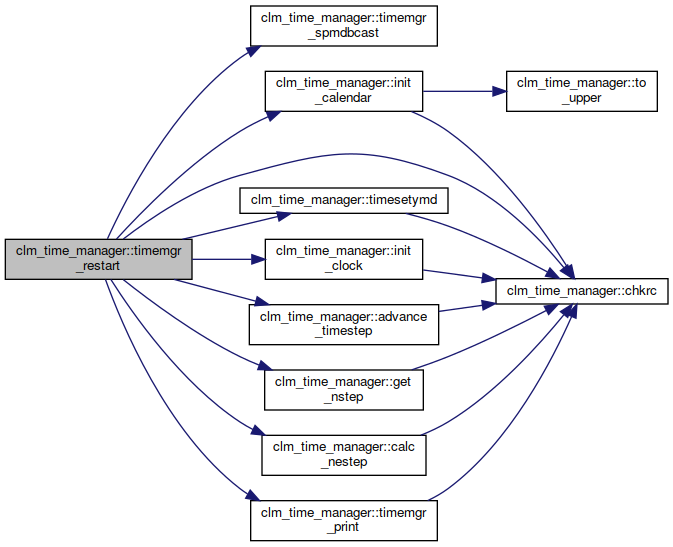
Here is the caller graph for this function:

◆ timemgr_restart_io()
| subroutine, public clm_time_manager::timemgr_restart_io | ( | type(file_desc_t), intent(inout) | ncid, |
| character(len=*), intent(in) | flag | ||
| ) |
Here is the call graph for this function:

Here is the caller graph for this function:

◆ timemgr_spmdbcast()
|
private |
Here is the caller graph for this function:

◆ timesetymd()
|
private |
Here is the call graph for this function:

Here is the caller graph for this function:
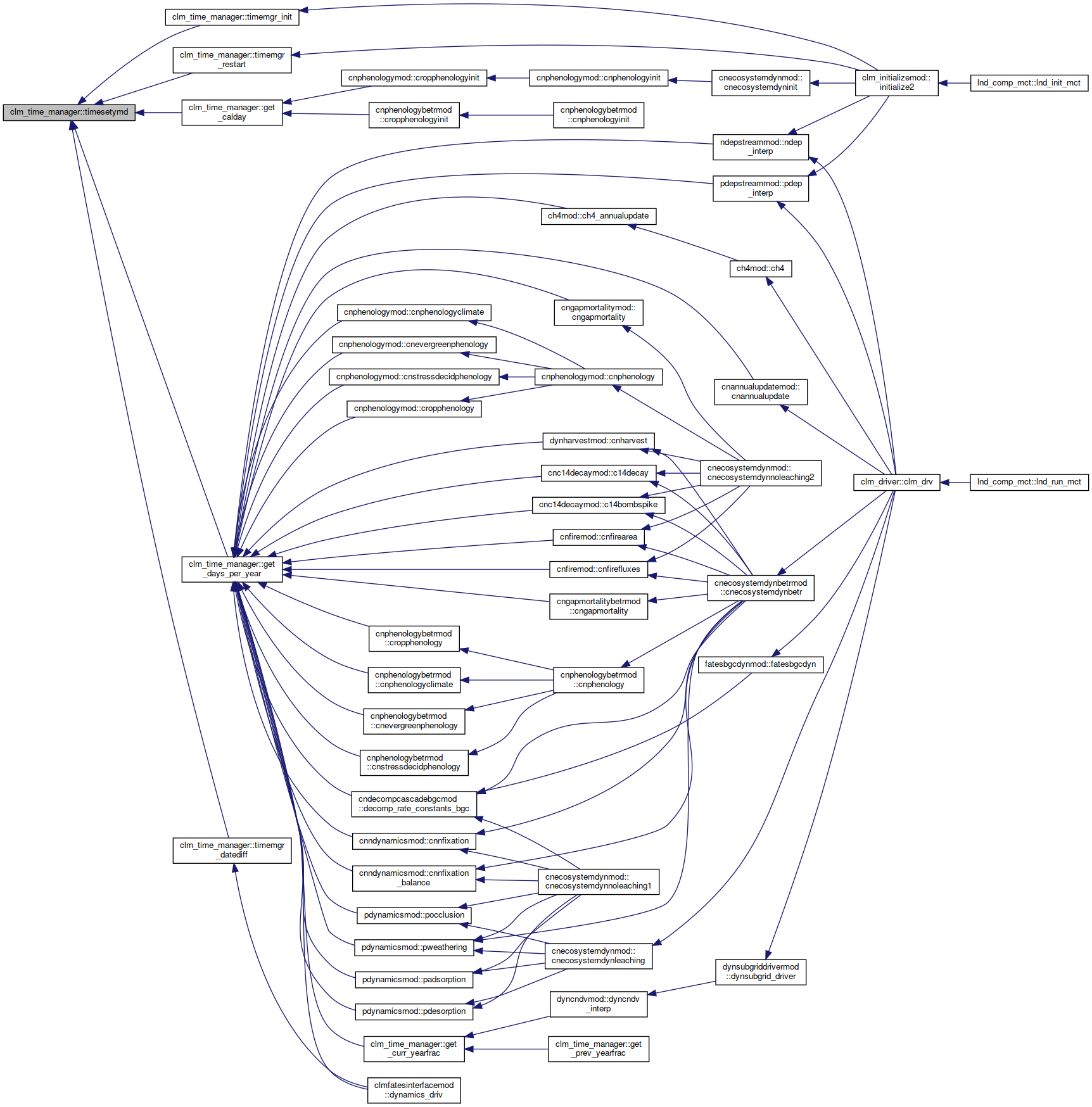
◆ to_upper()
|
private |
Here is the caller graph for this function:

◆ update_rad_dtime()
| subroutine, public clm_time_manager::update_rad_dtime | ( | logical, intent(in) | doalb | ) |
Here is the call graph for this function:

Here is the caller graph for this function:

Variable Documentation
◆ calendar
|
private |
◆ dtime
|
private |
◆ dtime_rad
|
private |
◆ gregorian_c
| character(len=*), parameter, public clm_time_manager::gregorian_c = 'GREGORIAN' |
◆ nelapse
|
private |
◆ nestep
| integer, save, public clm_time_manager::nestep = uninit_int |
◆ nextsw_cday
|
private |
◆ no_leap_c
| character(len=*), parameter, public clm_time_manager::no_leap_c = 'NO_LEAP' |
◆ nsstep
| integer, save, public clm_time_manager::nsstep = 0 |
◆ nstep_rad_prev
|
private |
◆ perpetual_ymd
|
private |
◆ ref_tod
|
private |
◆ ref_ymd
|
private |
◆ rst_curr_tod
|
private |
◆ rst_curr_ymd
|
private |
◆ rst_nstep_rad_prev
|
private |
◆ rst_ref_tod
|
private |
◆ rst_ref_ymd
|
private |
◆ rst_start_tod
|
private |
◆ rst_start_ymd
|
private |
◆ rst_step_sec
|
private |
◆ start_tod
|
private |
◆ start_ymd
|
private |
◆ stop_tod
|
private |
◆ stop_ymd
|
private |
◆ timemgr_set
|
private |
◆ tm_cal
|
private |
◆ tm_clock
|
private |
◆ tm_first_restart_step
|
private |
◆ tm_perp_calendar
|
private |
◆ tm_perp_date
|
private |
◆ uninit_int
|
private |
◆ uninit_r8
|
private |
